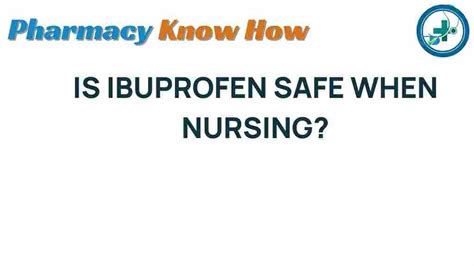What's Safe Ibuprofen Dose During Nursing? Expert Advice

When it comes to managing pain and reducing inflammation during nursing, ibuprofen is often considered a viable option for many mothers. However, it’s crucial to understand the safe dosage to ensure both the mother’s and baby’s well-being. The decision to use ibuprofen while nursing should be made under the guidance of a healthcare provider, as they can provide personalized advice based on the mother’s health status, the baby’s age, and other relevant factors.
Understanding Ibuprofen
Ibuprofen is a nonsteroidal anti-inflammatory drug (NSAID) that works by blocking the production of prostaglandins, which are substances in the body that mediate inflammation, pain, and fever. It’s commonly used for its analgesic (pain-relieving), antipyretic (fever-reducing), and anti-inflammatory effects. Ibuprofen is known to be relatively safe when used as directed, but like all medications, it carries potential risks and side effects, especially for vulnerable populations like nursing infants.
Ibuprofen and Breastfeeding
The use of ibuprofen during breastfeeding has been studied, and the consensus is that it is generally compatible with nursing. Ibuprofen is excreted in breast milk, but the amounts are considered to be very small. Studies suggest that less than 1% of the maternal dose of ibuprofen is excreted into breast milk over a 24-hour period. This low concentration is unlikely to cause significant effects on the nursing infant. However, as with any medication, monitoring the infant for any signs of adverse effects, such as gastrointestinal upset, is recommended.
Safe Dosage
The safe dosage of ibuprofen during nursing is typically the same as for non-breastfeeding adults. For most adults, the recommended dose is 200 to 400 mg every 4 to 6 hours as needed, not to exceed 1200 mg in 24 hours. It’s essential to follow these guidelines to minimize exposure to the baby while effectively managing the mother’s symptoms.
Considerations
Frequency and Duration: While the occasional use of ibuprofen is likely safe, prolonged or frequent use should be approached with caution. Mothers should consult their healthcare provider if they find themselves needing ibuprofen regularly.
Baby’s Age: For newborns (especially those under 3 months), the risk-benefit analysis may lean towards avoiding ibuprofen if possible, due to the immaturity of their renal function and potential increased sensitivity to medications.
Monitoring: Both the mother and the infant should be monitored for any adverse effects. If the baby shows any signs of illness, such as vomiting, diarrhea, or lethargy, after the mother’s ibuprofen use, medical advice should be sought.
Alternatives and Precautions
Acetaminophen (Paracetamol): For some mothers, especially those with concerns about ibuprofen or its potential interactions, acetaminophen might be considered as an alternative for pain and fever management. However, the same principle of using the lowest effective dose for the shortest duration applies.
Aspirin and Other NSAIDs: These are generally not recommended during breastfeeding due to the potential risk of Reye’s syndrome in infants and the effects on platelet aggregation.
Conclusion
The use of ibuprofen during nursing can be safe when taken as directed and under the guidance of a healthcare provider. Mothers should always prioritize consulting their healthcare provider before starting any medication, including ibuprofen, to discuss potential risks, benefits, and alternatives. By making informed decisions, mothers can effectively manage their health while minimizing risks to their baby.
FAQ Section
Is ibuprofen safe for breastfeeding mothers?
+Ibuprofen is generally considered safe for breastfeeding mothers when used at the recommended doses. However, it’s essential to consult a healthcare provider before starting any medication.
What are the potential risks of ibuprofen to the nursing infant?
+While ibuprofen is considered safe, potential risks to the infant include gastrointestinal upset. Monitoring the infant for any signs of adverse effects is recommended.
How should I take ibuprofen while breastfeeding?
+Take ibuprofen at the lowest effective dose for the shortest duration necessary. The typical adult dose is 200 to 400 mg every 4 to 6 hours as needed, not exceeding 1200 mg in 24 hours.
Are there alternatives to ibuprofen for pain management during breastfeeding?
+Yes, acetaminophen (paracetamol) can be an alternative for some mothers. However, it’s crucial to discuss options with a healthcare provider to determine the safest and most effective choice.
Should I monitor my infant for any specific signs after taking ibuprofen?
+Yes, monitor your infant for signs of gastrointestinal upset, such as vomiting or diarrhea, and seek medical advice if you notice any unusual symptoms or behaviors.
Can I use ibuprofen for an extended period while breastfeeding?
+Prolonged use of ibuprofen should be discussed with a healthcare provider. Frequent or long-term use may require closer monitoring of both the mother and the infant.



